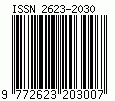AIR POLLUTION MANAGEMENT DUE TO COAL LOADING AND UNLOADING ACTIVITIES AT THE MAHAKAM COAL TERMINAL JETTY
DOI:
https://doi.org/10.33556/jstm.v26i1.453Abstract
Coal loading and unloading operations at the Mahakam Coal Terminal Jetty in Embalut Village, East Kalimantan, have contributed significantly to local air pollution. Fine coal dust particles are released into the surrounding environment, negatively impacting the health of workers and nearby communities. This study aims to examine the causes of air pollution at the jetty and identify suitable mitigation strategies. A descriptive qualitative approach was applied, with data collected through direct observation, interviews with stakeholders (including operational staff, HSE personnel, and the village head), and documentation of jetty activities and environmental conditions. Data credibility was ensured using triangulation. Results reveal that the main contributor to air pollution is the absence of effective dust control systems, particularly during the loading and unloading processes. Additional factors, such as high wind speeds, intense operational activity, and the lack of buffer vegetation, worsen the pollution levels. Health complaints reported by residents include respiratory issues, eye irritation, and skin problems. While some mitigation efforts such as water spraying systems, dust nets, equipment cleaning, and periodic air quality checks have been introduced, their implementation remains inconsistent. To address this, the study recommends the systematic adoption of Standard Operating Procedures (SOP) and the development of green infrastructure to minimize long-term environmental impacts
Downloads
Published
Issue
Section
License
Authors who publish with this journal agree to the following terms:Authors retain copyright and grant the journal right of first publication with the work simultaneously licensed under a Creative Commons Attribution License that allows others to share the work with an acknowledgement of the work's authorship and initial publication in this journal.
Authors are able to enter into separate, additional contractual arrangements for the non-exclusive distribution of the journal's published version of the work (e.g., post it to an institutional repository or publish it in a book), with an acknowledgement of its initial publication in this journal.
Authors are permitted and encouraged to post their work online (e.g., in institutional repositories or on their website) prior to and during the submission process, as it can lead to productive exchanges, as well as earlier and greater citation of published work (See The Effect of Open Access).







